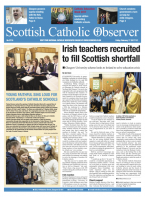BY Ian Dunn | December 4 | ![]() 0 COMMENTS
0 COMMENTS ![]() print
print

Missing weather
In Ethiopia, climate change is not just a cause, it is life and death. IAN DUNN reports from his visit with SCIAF
Kalich Kenchero has lost the weather. For decades he has been famous among his people, the Borana of Southern Ethiopia, for his uncanny ability to predict rain and sun, drought or flood.
Several years ago the Ethiopian Government sent a group of professional mythologists to Southern Ethiopia, to test their skills against the traditional forecasters of the Borana like him. There was almost no difference between the two. Kalich could use the positions of the stars, the blooming of bushes, and the migration of animals to predict the weather with remarkable accuracy.
But now nature is talking gibberish.
“The signs say that a drought is coming,” the 76-year-old said. “But they also say that heavy rains are coming. The rains that came from the East, now comes from the West. The droughts that came every ten years, now come every three. It’s confusing: I do not know what will happen.”
Despite his waning powers, Kalich is still one of the lucky ones. With help from SCIAF and their local partners SOS Sahel, his village has been able to drastically deepen their wlla or well, that provides water for the Cattle that are key to his people’s existence. It now provides water even in the worst droughts.
“Without this every living thing that lives around this place would have died,” he said. “All life would have ended, even the Borana.”
In Ethiopia climate change is not just a cause, it is life and death. Today the country, still one the world’s poorest, faces fresh disaster as the El Niño weather system drags the country’s weather haywire. The Northern highlands are ravaged by drought with no rain in some places for eight months. The people worked just as hard as every other year but the rains didn’t come. Without rain, the crops perish, without rain, cattle sicken and perish and, without rain, people die. Meanwhile, in parts of the south unseasonably heavy rains threaten floods.
The rivers burst, the cattle drown and people die. Both are disastrous in a country where 80 million are involved in rural farming in some way.
The Government says $600 million dollars are needed to stave off crisis and estimates as many as 20 million people could struggle without food next year. With fire above and water below Ethiopia is caught in the middle.
Yet the country is far from helpless. Its bustling capital of Addis Adaba is a vibrant commercial hub littered with the metal shoots of skyscrapers. The Government operates the largest social programme in Africa helping to feed seven million of its poorest citizens. Recently Chinese-built roads are straight and true and a new light railway system dominates the capital’s skyline. The weekend we arrive, the Great Ethiopian Run sees 50,000 people run through the city in a joyous exuberating festival of a run, underpinned by a level of precision management many
European cities would struggle to match. There are now more than 700,000 refugees in Ethiopia feeding conflict and hunger in Somalia, Eritrea, South Sudan, the Yemen and more. It is now a place those in need flee to rather than from. The Ethiopia of the popular British memory is a wisp of the past.
Margins remain fine, however. Patricia Wall, director of the joint CAFOD, SCIAF and Trocaire office in Addis Ababa, who works with 30 different Ethiopian projects says ‘this is a critical moment for Ethiopia.’
“Ethiopia has often had problems in the past with drought and food insecurity,” she said. “But where these crises used to happen once a decade now it’s once every couple of years. The cycle of suffering has intensified.”
She believes the worlds richest countries have to take responsibility for the impact of climate change on the worlds’ poorest.
“The women walking seven hours for water, because the planet has warned and wells dried up,” she said. “She didn’t cause that and the carbon that didn’t come from the Horn of Africa.”
Her deepest hope is that the world leaders now meeting in Paris to seek global agreement on climate change, learn the lessons of Pope Francis’ recent encyclical on the environment Laudato Si’.
“The Pope said listen to the cry of the earth, listen to the cry of the poor,” she added “That is a call for all people to be accountable for their actions.”
For Kalich Kenchero, the Pope’s words ring true. The world leaders meeting in Paris, he hopes, will be accountable.
“I want them to be accountable for their actions and aware of our lives here,” he said. “I want them to listen.”
He asks this not for himself, but for his children.
“I am illiterate, but my proudest achievement is that my children have all gone to school because education is the solution. With education they can solve the problems we face.”
— Visit http://www.sciaf.org.uk.SCIAF will be focusing on Ethiopia for its 2016 Wee Box campaign.











